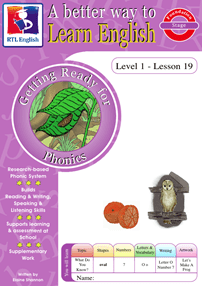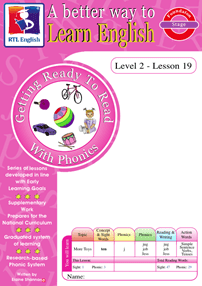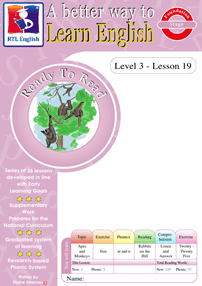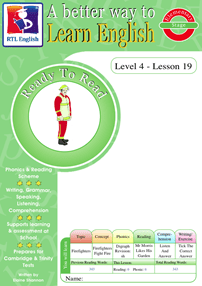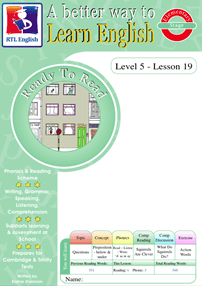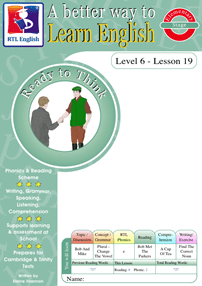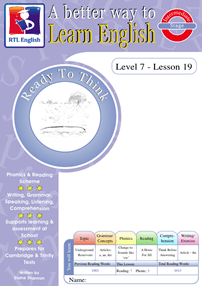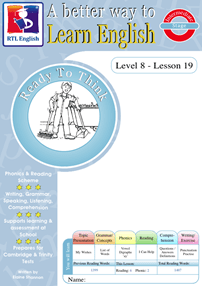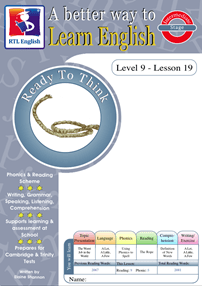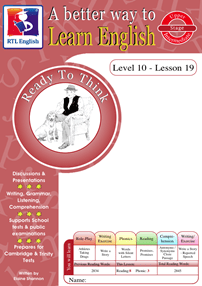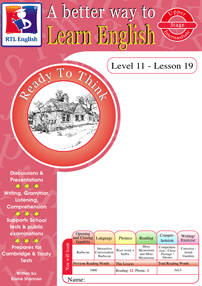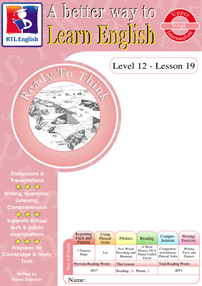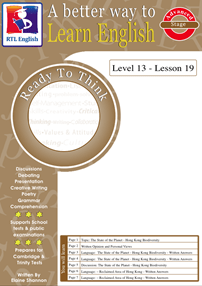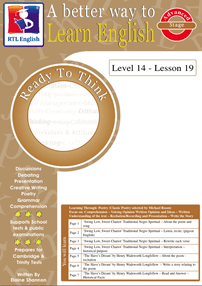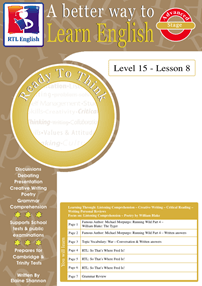English lessons for kids in Granger, Utah

For nearly 30 years, RTL English has been taught at home, in tutorial centres & at schools both as part of the curriculum and as a supplementary activity. RTL English is growing in popularity worldwide, so why not join hundred of thousands of parents, tutors & teachers around the globe & teach your son or daughter RTL English today?
Teaching your son or daughter to use English proficiently might very well be the key to their success in school in Utah, at exams, in their career and beyond.
Teaching English to your child might be the key, not only to their success in school in Granger, but also their sense of self-worth, both in Utah and beyond.
Elaine Shannon, Author & Curriculum Designer Tweet
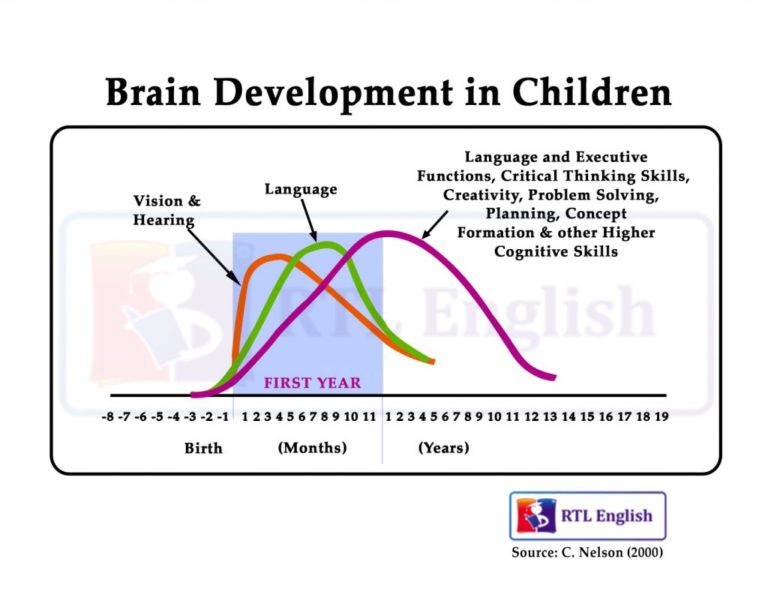
- Early & advanced English skills will make your son or daughter smarter.
- Early & advanced English skills will improve problem solving.
- Early & advanced English skills will improve planning, and abstract thinking skills.
- Early & advanced English skills will help develop complex idea comprehension.
- Early reading can help children compensate for modest levels of ability in other areas. (*Ref)
ON A PRACTICAL LEVEL, HOW IMPORTANT IS EARLY READING?
- Your son or daughter’s reading ability and vocabulary at 3 years old might predict his or her success in school in Granger when they are 6 to 7 years old (*Ref).
- Your child’s reading ability at 6 to 7 years old might predict their success at 17 to 18 years old (*Ref)!
- Your child’s reading ability at 7 to 8 years old might determine their graduation from senior school in Granger (*Ref).
ON THE OTHER HAND:
- Children who can’t read fluently by 7 to 8 years old are four times more likely to leave school without a diploma/results than proficient readers (*Ref).
and:
- Children who are not taught Phonemic Awareness, and therefore have to rely on memory have difficulty beginning to read & continue to have difficulty with new words.
BUT, SURELY SCHOOL WILL TEACH MY CHILD TO READ? SO, WHY DO I NEED TO BOTHER?
If this is what you are thinking, then you should know that you cannot rely on schools, including those in Granger …
- In the USA, almost 70% of children at school who are aged 9-10 years old cannot read proficiently (*Ref)!
- And, of those children, 33% of them read at only a very basic level, and 34% are reading at a very low level (*Ref).
- It’s not very different in the UK, where over 100,000 children leave school illiterate(*Ref).
- Or in Australia, where 33% of students aged 11 years old fail to meet literacy benchmarks (*Ref).
- Or in Canada, where 42% of the entire adult population is only semi-illiterate (*Ref).
NO, YOU CANNOT RELY ON SCHOOLS.
But, why not?
- Teachers don’t always understand the basic building blocks of language and reading
- Teachers all too frequently don’t know how to teach English language concepts
- There just aren’t enough qualified teachers
- Classes are too large
- Kids don’t get enough attention from teachers in the classroom
- Schools aren’t using the correct teaching systems – i.e they rely on rote learning or sight words
- Schools are overwhelmed and have tried to shift some of the burden of teaching onto apps & computers
UNFORTUNATELY, IT IS A FACT THAT:
Being illiterate is a guaranteed ticket to a dead end.
YOU NEED TO TAKE CHARGE OF YOUR CHILD’S EDUCATION – TODAY!
BUT HOW?
You can begin by teaching English to your son or daughter.
By Teaching your son or daughter to read your son or daughter will develop early reading skills that will help put them years ahead of other children in Utah. So, if you’ve decided that you want to become a proud parent of a happy & smart son or daughter, then you owe it to your child to teach them to read and improve their English.
WE HELP PARENTS TEACH ENGLISH TO CHILDREN
RTL English™ offers 600 easy-to-teach & downloadable English lessons for parents to teach to their child at home. Our lessons will enable your child to catch up, keep up and stay ahead! Our workbook lessons also challenge more advanced students; so whatever your son or daughter’s ability, there’s sure to be an RTL English workbook lesson that’s suitable for them.
THE RTL ENGLISH CURRICULUM CONSISTS OF 15 YEARS (LEVELS) OF TEACHING MATERIALS WHICH INCLUDE 600 WORKBOOKS COMPRISED OF 4,000 WORKSHEETS AND NINETEEN THOUSAND TEACHING NOTES & WILL SAVE YOU OVER 2,000 DAYS OF LESSON PREPARATION TIME!
Foundation Stage
Includes Level 1, 2 & 3.
Suitable for kids aged 3-6 years old in Granger, Utah
Elementary Stage
Includes Level 4, 5 & 6.
Suitable for kids aged 6-9 years old in Granger, Utah
Intermediate Stage
Includes Level 7, 8 & 9.
Suitable for kids aged 9-12 years old in Granger, Utah
Upper Intermediate Stage
Includes Level 10, 11 & 12.
Suitable for kids aged 12-15 years old in Granger, Utah
Advanced Stage
Incl. Level 10, 11 & 12.
Suitable for kids aged 15-18 years old in Granger, Utah
Winning Awards Since 1996
With 24 years of research, development, dedication and experience, RTL English is committed to offering the best possible start to English language learners worldwide. RTL English is part of the Ready To Learn group, an international educational organisation with students worldwide.
Elaine Shannon founded Ready To Learn in 1996, and is an internationally respected author, language expert and School Principal with more than 40 years of specialist experience. Elaine & her team of instructional designers, linguists and educational experts developed the RTL English Curriculum.
What Happens In A Lesson?
- Each lesson is designed to last approximately 60 minutes. Normally, your child will spend 55 minutes participating in learning activities, and 5 minutes completing an achievement exercise that’s used to reinforce the lessons’ learning designs & objectives.
- Each lesson is accompanied by an RTL English lesson workbook. The workbook consists of six worksheets of instructional content and one reinforcement exercise page.
- You will use the workbook & teaching notes to guide and lead your child through the variety of learning activities in the workbook.
- Although all of our workbooks follow a similar format, each one is slightly more challenging than the last in the sequence. As a result, your child will be able to advance in small manageable steps & acquire English language skills that will last them a lifetime.
- There are 5 learning stages, 15 learning levels and 600 lessons in the RTL English curriculum.
- Your child will need to complete 36 lessons to finish one learning level – which lasts approximately 1 academic year.
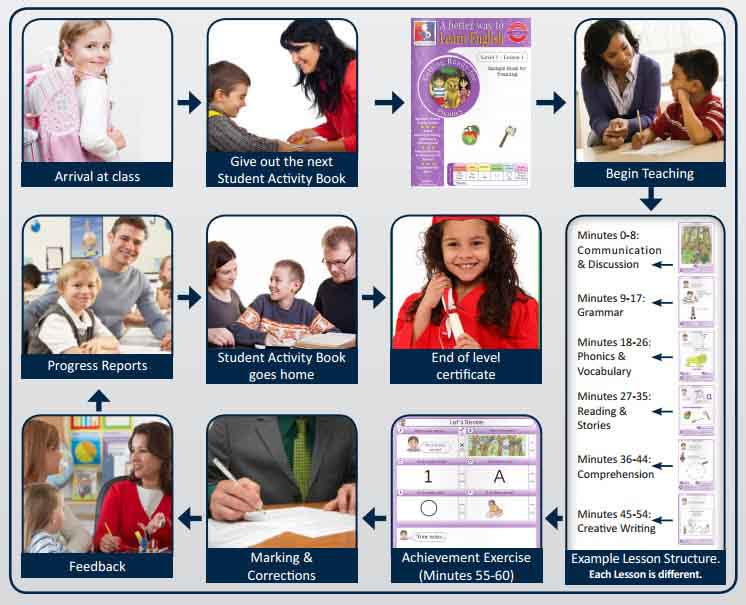
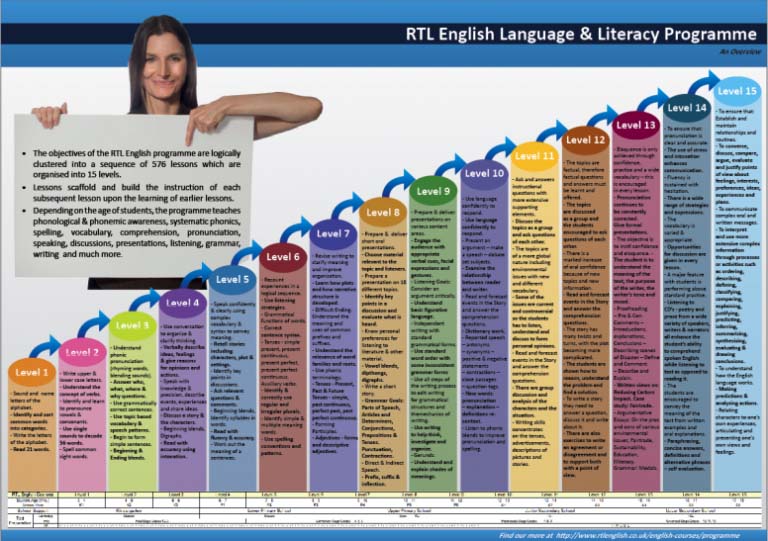
What Will My Child Be Taught?
It depends on your child’s age and their English language ability. To find out what your child will be taught, please click the grey button & then click the book cover that’s closest to your child’s current age → Lesson Workbooks
The RTL English Curriculum teaches all the communicative functions and language forms your child will need to succeed in school, exams and beyond, including:
- Phonemic Awareness
- Alphabetic Principle
- Systematic & Explicit Phonics
- Fluency with Text
- Proficient Grammar Knowledge
- Creative Writing
- Expanded Vocabulary
- Advanced Comprehension, and
- Confident Speaking Skills
The RTL English Curriculum: Kids 3 to 18 Years Old
Whatever your child’s age or English language ability, there is sure to be an RTL English course (aka ‘level’) that will help your son or daughter learn or improve his or her English. This is because our curriculum provides 15 years of learning for child aged 3 to 18 years old and teaches all the communicative functions & language forms your child will need to have a richer, more successful educational experience. RTL English will also supplement your child’s learning at his or her school in Granger.
The RTL English Curriculum consists of 15 years (levels) of teaching materials which include 600 workbooks (comprising 4,000 worksheets & 19,000 teaching notes) & saves over 2,000 days of preparation time.Level 1
Kids: 3-4 years old
36 lessons. 36 workbooks. 252 worksheets. 1134 teaching instructions.
Level 2
Kids: 4-5 years old
36 lessons. 36 workbooks. 252 worksheets. 1134 teaching instructions.
Level 3
Kids: 5-6 years old
36 lessons. 36 workbooks. 252 worksheets. 1134 teaching instructions.
Level 4
Kids: 6-7 years old
36 lessons. 36 workbooks. 252 worksheets. 1134 teaching instructions.
Level 5
Kids: 7-8 years old
36 lessons. 36 workbooks. 252 worksheets. 1134 teaching instructions.
Level 6
Kids: 8 -9 years old
36 lessons. 36 workbooks. 252 worksheets. 1134 teaching instructions.
Level 7
Kids: 9-10 years old
36 lessons. 36 workbooks. 252 worksheets. 1134 teaching instructions.
Level 8
Kids: 10-11 years old
36 lessons. 36 workbooks. 252 worksheets. 1134 teaching instructions.
Level 9
Kids: 11-12 years old
36 lessons. 36 workbooks. 252 worksheets. 1134 teaching instructions.
Level 10
Teens: 12-13 years old
36 lessons. 36 workbooks. 252 worksheets. 1134 teaching instructions.
Level 11
Teens: 13-14 years old
36 lessons. 36 workbooks. 252 worksheets. 1134 teaching instructions.
Level 12
Teens: 14-15 years old
36 lessons. 36 workbooks. 252 worksheets. 1134 teaching instructions.
Level 13
Teens: 15-16 years old
36 lessons. 36 workbooks. 252 worksheets. 1134 teaching instructions.
Level 14
Teens: 16-17 years old
36 lessons. 36 workbooks. 252 worksheets. 1134 teaching instructions.
Level 15
Teens: 17-18 years old
8 lessons. 8 workbooks. 56 worksheets. 252 teaching instructions.
Can I See A Lesson Workbook?
There are 600 workbooks like the one below. Lesson 19, Level 1 below suits children between 3 and 4 years old. To see an example of a lesson workbook that is likely to suit your child, please click the grey button & then click the book cover that’s closest to your child’s current age → Lesson Workbooks
What Method Do You Use?
- We teach using a Step-by-Step method. The content of each lesson is determined by an 8-page workbook that’s slightly more challenging than the last in the sequence. Lessons ‘scaffold’ and build upon the learning of the previous lesson. As a result, students advance in small, manageable steps and acquire English language skills that enable them to achieve better results in school, exams & beyond..
- Sequenced instruction is organised into 5 developmentally appropriate stages, 15 levels of increasing difficulty and 600 lessons. Each lesson provides one hour of learning per week and follows a workbook that consists of six worksheets with instructional content and one reinforcement exercise page.:
- Each lesson is accompanied by a workbook follows a similar plan:
- Page 1 :: Communication/ Discussion/ Topic orientated
- Page 2 :: Grammar/ Language
- Page 3 :: Phonics/ Vocabulary
- Page 4 :: Reading (Ongoing Story)
- Page 5 :: Story Comprehension/ Language
- Page 6 :: Grammar/ Language Exercise
- Page 7 :: Achievement Exercise / Assessment
- Depending on your child’s age and their English skills, instruction will typically consist of a variety of activities including speaking, listening, letter-sound correspondence, sight words, guided oral reading, text comprehension, creative writing, grammar and critical thinking.
- You don’t need to prepare anything or create teaching materials for an RTL English lesson. It’s all been done for you. Each page of this workbook contains teaching notes to enable you to guide and lead your child through the learning activities. Once your son or daughter has finished their lesson, record their achievements in the progress report form and then simply print the next workbook in the sequence.
Will My Child Learn Phonics?
- Yes! We teach synthetic & analytical phonics which includes 44 basic phonemes, 22 beginning blends and 15 ending blends.Our students learn and practise phonics throughout our Foundation, Elementary, Intermediate and Upper Intermediate stages. Our Advanced stage uses phonics to teach pronunciation.
- We pay particular attention to blended consonant sounds (that are located at the beginning and end of many words). We teach vowels first and then consonants. As soon as possible we teach children to read. In practice this means after students have learnt 5 vowel sounds and 2 consonants they can read a few words by themselves. Children are also taught how to decode words, so from the very beginning they can see new simple words and know how to read them.
Coordinates: 39°N 111°W / 39°N 111°W / 39; -111
Utah ( YOO-tah, YOO-taw) is a allow in in the western United States. It is bordered by Colorado to the east, Wyoming to the northeast, Idaho to the north, Arizona to the south, and Nevada to the west. It next touches a corner of New Mexico in the southeast. Of the fifty U.S. states, Utah is the 13th-largest by area, and following a population beyond three million, the 30th-most-populous and 11th-least-densely populated. Urban loan is mostly concentrated in two areas: the Wasatch Front in the north-central ration of the state, which is home to on two-thirds of the population, and Washington County in the south, with on top of 170,000 residents. Most of the western half of Utah lies in the Great Basin.
The territory of advocate Utah has been inhabited by various indigenous groups for thousands of years, including the ancient Puebloans, the Navajo, and the Ute. The Spanish were the first Europeans to arrive in the mid-16th century, though the region's hard geography and climate made it a peripheral ration of New Spain and far along Mexico. Even though it was portion of Mexico, many of Utah's early settlers were American, particularly Mormons fleeing marginalization and persecution from the United States. Following the Mexican-American War, it became portion of the Utah Territory, which included what is now Colorado and Nevada. Disputes with the dominant Mormon community and the federal doling out delayed Utah's entrйe as a state; only after the outlawing of polygamy was it admitted as the 45th, in 1896.
A Tiny more than half of whatever Utahns are Mormons, the Big majority of whom are members of the Church of Jesus Christ of Latter-day Saints (LDS Church), which has its world headquarters in Salt Lake City. Utah is the only disclose where most of the population belongs to a single church. The LDS Church greatly influences Utahn culture, politics, and daily life, though back the 1990s the declare has become more religiously diverse as competently as secular.
The own up has a extremely diversified economy, with major sectors including transportation, education, information technology and research, government services, and mining and a major tourist destination for outdoor recreation. In 2013, the U.S. Census Bureau estimated that Utah had the second-fastest-growing population of any state. St. George was the fastest-growing metropolitan Place in the United States from 2000 to 2005. Utah furthermore has the 14th-highest median average allowance and the least income inequality of any U.S. state. A 2012 Gallup national survey found Utah overall to be the "best welcome to flesh and blood in the future" based upon 13 difficult measurements including various economic, lifestyle, and health-related position metrics.
Academic References
- The Cognitive Foundations of Learning to Read: A FrameWork Sebastian Wren
- The relatonship of phonemic awareness to reading acquisiton: more consequence than preconditon but still important. Wimmer H, Landerl K, Linortner R, Hummer P. University of Salzburg, Austria.
- NAEP 1998 Reading Report Card for the Nation and the States March 1999 Authors: Patricia L. Donahue, Kris n E. Voelkl, Jay R. Campbell, and John Mazzeo
- National Institute of Child Health and Human Development. (2000). Report of the National Reading Panel. Teaching children to read: An evidence-based assessment of the scientific research literature on reading and its implications for reading instruction (NIH Publica on No. 00-4769). Washington, DC: U.S. Government Prin ng Office.
- Wikipedia: http://en.wikipedia.org/wiki/Functional_illiteracy
- J Learn Disabil. 2009 Sep-Oct;42(5):392-402. Epub 2009 Jun 19. Why elementary teachers might be inadequately prepared to teach reading. Joshi RM, Binks E, Hougen M, Dahlgren ME, Ocker-Dean E, Smith DL.
- Australia Government Department of Educa on, Science and Training: htt p://www.dest.gov.au/archive/schools/literacy&numeracy/charts.html
- CBC News: Canada’s Shame – h p://www.cbc.ca/news/background/educa on/canada-shame.html
- The Timing and Quality of Early Experiences Combine to Shape Brain Architecture Center on the Developing Child, Harvard University
- Vocabulary Development and Instruc on: A Prerequisite for School Learning Andrew Biemiller, University of Toronto iii. Early reading acquisiton and its relation to reading experience and ability 10 years later. Cunningham AE, Stanovich KE.
- Double Jeopardy How Third-Grade Reading Skills and Poverty Influence High School Gradua on Donald J. Hernandez, Hunter College and the Graduate Center
- What Reading Does for the Mind ANNE E. CUNNINGHAM and KEITH E. STANOVICH

